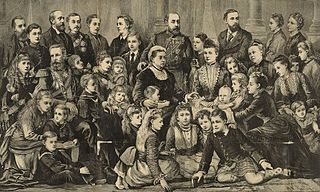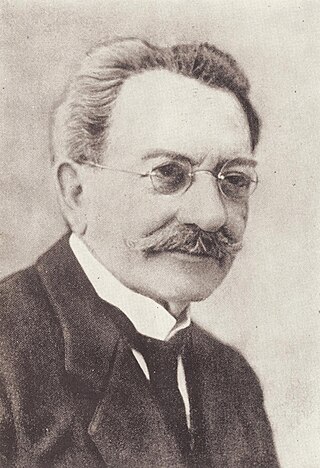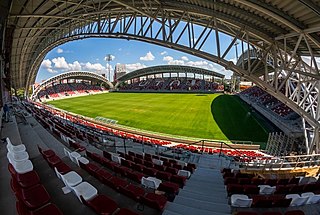Related Research Articles

Romania is a country located at the crossroads of Central, Eastern and Southeast Europe. It borders Ukraine to the north and east, Hungary to the west, Serbia to the southwest, Bulgaria to the south, Moldova to the east, and the Black Sea to the southeast. It has a mainly continental climate, and an area of 238,397 km2 (92,046 sq mi) with a population of 19 million people. Romania is the twelfth-largest country in Europe and the sixth-most populous member state of the European Union. Europe's second-longest river, the Danube, empties into the Danube Delta in the southeast of the country. The Carpathian Mountains cross Romania from the north to the southwest and include Moldoveanu Peak, at an altitude of 2,544 m (8,346 ft). Bucharest is the country's largest urban area and economic hub. Other major urban centres include Cluj-Napoca, Timișoara, Iași, Constanța and Brașov.

Michael I was the last King of Romania, reigning from 20 July 1927 to 8 June 1930 and again from 6 September 1940 until his forced abdication on 30 December 1947.

The national flag of Romania is a tricolour featuring three equal vertical bands colored blue, yellow and red, with a width to length ratio of 2:3.

Carol I or Charles I of Romania, was the monarch of Romania from 1866 to his death in 1914, ruling as Prince (Domnitor) from 1866 to 1881, and as King from 1881 to 1914. He was elected Prince of the Romanian United Principalities on 20 April 1866 after the overthrow of Alexandru Ioan Cuza by a palace coup d'état. In May 1877, Romania was proclaimed an independent and sovereign nation. The defeat of the Ottoman Empire (1878) in the Russo-Turkish War secured Romanian independence, and he was proclaimed King on 26 March [O.S. 14 March] 1881. He was the first ruler of the Hohenzollern-Sigmaringen dynasty, which ruled the country until the proclamation of a socialist republic in 1947.

The Kingdom of Romania was a constitutional monarchy that existed from 25 March [O.S. 13 March] 1881 with the crowning of prince Karl of Hohenzollern-Sigmaringen as King Carol I, until 1947 with the abdication of King Michael I and the Romanian parliament's proclamation of the Romanian People's Republic.

George Enescu, known in France as Georges Enesco, was a Romanian composer, violinist, pianist, conductor, and teacher and is regarded as one of the greatest musicians in Romanian history.
The Romanian Old Kingdom is a colloquial term referring to the territory covered by the first independent Romanian nation state, which was composed of the Romanian Principalities: Wallachia and Moldavia. The union of the two principalities was achieved when, under the auspices of the Treaty of Paris (1856), the ad hoc Divans of both countries, which were then under Ottoman Empire suzerainty, voted for Alexander Ioan Cuza as their prince. This process achieved a de facto unification under the name of the United Principalities of Moldavia and Wallachia. The region itself is defined by the result of that political act, followed by the Romanian War of Independence, the inclusion of Northern Dobruja and the transfer of the southern part of Bessarabia to the Russian Empire in 1878, the proclamation of the Kingdom of Romania in 1881, and the annexation of Southern Dobruja in 1913.

Alexandru Marghiloman was a Romanian conservative statesman who served for a short time in 1918 (March–October) as Prime Minister of Romania, and had a decisive role during World War I.

Constantin Angelescu was a Romanian politician who served as ad interim/acting Prime Minister of Romania for five days, between 30 December 1933 and 3 January 1934.

Ion Ionel Constantin Brătianu was a Romanian politician, leader of the National Liberal Party (PNL), Prime Minister of Romania for five terms, and Foreign Minister on several occasions; he was the eldest son of statesman and PNL leader Ion Brătianu, the brother of Vintilă and Dinu Brătianu, and the father of Gheorghe I. Brătianu. Ion I. C. Brătianu's political activities after World War I, including part of his third and fourth term, saw the unification of the Old Romanian Kingdom with Transylvania, Bukovina and Bessarabia. In 1923, he was elected an honorary member of the Romanian Academy.
The Conservative Party was between 1880 and 1918 one of Romania's two most important parties, the other one being the Liberal Party. The party was the party of government for a total of 14 years, more than a third of its existence.

Anghel Saligny was a Romanian engineer, most famous for designing the Fetești-Cernavodă railway bridge (1895) over the Danube, the longest bridge in Europe at that time. He also designed the storage facilities in Constanța seaport, one of the earliest examples of reinforced concrete architecture in Europe.
The Nemzeti Bajnokság, also known as NB I, is the top flight of Hungarian football league system. The league is officially named OTP Bank Liga after its title sponsor, OTP Bank.

The Liga I, also spelled as Liga 1, is a Romanian professional league for men's association football clubs. Currently sponsored by betting company Superbet, it is officially known as the SuperLiga. It is the country's top football competition, being contested by 16 clubs which take part in a promotion and relegation system with the Liga II. The teams play 30 matches each in the regular season, before entering the championship play-offs or the relegation play-outs according to their position in the regular table.

Queen Victoria, the British monarch from 1837 to 1901, and Prince Albert had 9 children, 42 grandchildren, and 87 great-grandchildren. Victoria was called the "grandmother of Europe".

Vladimir Viktorovich Sakharov was a Russian general of the cavalry who served in the Russian Imperial Army. In his army career from 1869 to 1917, he served in the Russo-Turkish War of 1877-1878, the Russo-Japanese War, and World War I.

Elena Alexandra Apostoleanu, known professionally as Inna, is a Romanian singer. Born in Mangalia and raised in Neptun, she studied political science at Ovidius University before meeting the Romanian trio Play & Win and pursuing a music career. She adopted the stage name "Alessandra" and a pop-rock style in 2008; later that year, she changed her stage name to "Inna" and began releasing EDM, house and popcorn music. "Hot" (2008), her debut single, was a commercial success worldwide and topped the Romanian and Billboard's Hot Dance Airplay chart, among others. Her debut studio album of the same name followed in August 2009 and was certified Gold and Platinum. It featured several other successful singles in Europe, including "Amazing" (2009), the singer's second number-one single in Romania.

Lazăr Șăineanu was a philologist, linguist, folklorist and cultural historian born in the United Principalities of Moldavia and Wallachia, today part of Romania. A specialist in Oriental and Romance studies, as well as a Germanist, he was primarily known for his contribution to Yiddish and Romanian philology, his work in evolutionary linguistics, and his activity as a literary and philological comparatist. Șăineanu also had innovative contributions to the investigation and anthologizing of Romanian folklore, placed in relation to Balkan and East Central European traditions, as well as to the historical evolution of Romanian in a larger Balkan context, and was a celebrated early contributor to Romanian lexicography. His main initiatives in these fields are a large corpus of collected fairy tales and the 1896 Dicționarul universal al limbii române, which have endured among the most popular Romanian scientific works.

Constantin I. Stoicescu was a politician and diplomat who held several ministerial positions in the Kingdom of Romania.

Francisc von Neuman Stadium is a football stadium in Arad, Romania. It is built on the site of the former Francisc von Neuman Stadium. The stadium was opened on 28 August 2020 and currently serves as the home for UTA Arad of the Liga I.
References
- ↑ Cristoiu, Ion (2010-05-16). "26 martie 1901: Să punem capăt cheltuielilor nebune! (I)" [26 March 1901: Let's put an end to insane spendings! (I)]. Adevărul (in Romanian). Archived from the original on 2019-12-17. Retrieved 2023-04-18.